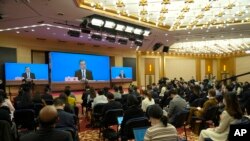ຜູ້ນຳທາງການເມືອງລະດັບສູງຂອງຈີນ ໄດ້ພົບປະກັນຢູ່ນະຄອນຫຼວງປັກກິ່ງໃນອາທິດນີ້ ແລະໄດ້ປະກາດເປົ້າໝາຍ GDP ໃໝ່ຂອງປະເທດໃນປີ 2022, ກໍຄືເກນມາດຕະຖານສຳຄັນທີ່ນາຍົກລັດຖະມົນຕີຫລີ ເຄີ້ສຽງກ່າວວ່າ ຈະຢູ່ປະມານ 5.5 ເປີເຊັນ ຊຶ່ງເປັນເປົ້າໝາຍຕ່ຳທີ່ສຸດ ໃນຮອບຫຼາຍທົດສະວັດ.
ຫຼັງຈາກສອງປີແຫ່ງການຕໍ່ສູ້ກັບການລະບາດຂອງໄວຣັສໂຄໂຣນາແລ້ວ ປັກກິ່ງ ຍັງຕ້ອງໄດ້ຮັບມືກັບຄວາມວຸ້ນວາຍໃນຕະຫຼາດອະສັງຫາລິມະຊັບ ແລະການລົ້ມ ລະລາຍຂອງບັນດາບໍລິສັດພັດທະນາອະສັງຫາລິມະຊັບໃຫຍ່, ຫນີ້ສິນທີ່ເພີ່ມຂຶ້ນ ແລະຄວາມເຄັ່ງຕຶງທາງການຄ້າຢ່າງຕໍ່ເນື່ອງກັບສະຫະລັດ. ແຕ່ບັນດາຜູ້ນຳກ່າວຢ່າງເປີດເຜີຍພຽງເລັກນ້ອຍ ກ່ຽວກັບການບຸກລຸກຂອງຣັດເຊຍ ໃນຢູເຄຣນ ວ່າມັນຈະສົ່ງຜົນກະທົບຕໍ່ການເຕີບໂຕດ້ານເສດຖະກິດຄືແນວໃດ.
ພວກນັກວິເຄາະບອກນັກຂ່າວວີໂອເອພາສາຈີນກາງວ່າ ສົງຄາມໃນຢູເຄຣນ ອາດຈະສົ່ງຜົນກະທົບທັງໄລຍະສັ້ນ ແລະໄລຍະຍາວ ເຊັ່ນວ່າ ການຄ້າຂາຍສິນ ຄ້າຖືກກະທົບກະເທືອນ ແລະການເພີ້ມຄວາມພະຍາຍາມຂອງສະຫະລັດ ທີ່ຈະປ້ອງກັນຕົນເອງບໍ່ໃຫ້ຖືກຜົນກະທົບໜັກທາງດ້ານພູມສາດການເມືອງ ຕໍ່ຕ່ອງໂສ້ການສະໜອງສິນຄ້າສາກົນ ທີ່ໄດ້ຮັບແຮງຜັກດັນຈາກພາກສ່ວນທີ່ ສຳຄັນຂອງເສດຖະກິດຈີນ. .
ເຈົ້າໜ້າທີ່ຈີນໃນອາທິດນີ້ ບໍ່ໄດ້ປະຕິເສດການທ້າທາຍທີ່ເຂົາເຈົ້າປະເຊີນຢູ່ ແຕ່ກໍຍັງມີຄວາມໝັ້ນໃຈ.
ໃນການກ່າວຄຳປາໄສໃນລະຫວ່າງກອງປະຊຸມສອງຄັ້ງຊຶ່ງໄດ້ເລີ້ມຂຶ້ນໃນທ້າຍອາທິດແລ້ວນີ້ ແລະສິ້ນສຸດລົງໃນວັນສຸກຜ່ານມານັ້ນ ທ່ານຫຼີ ກ່າວວ່າ, "ບໍ່ມີຄວາມສົງໄສວ່າເສດຖະກິດຂອງຈີນຈະທົນທານຕໍ່ຄວາມກົດດັນໃຫ້ຫຼຸດລົງ ແລະສືບຕໍ່ເຕີບໂຕຢ່າງບໍ່ຢຸດຢັ້ງໄປໃນອະນາຄົດ."
ຢ່າງໃດກໍ່ຕາມ, ນັກເສດຖະສາດ ຄິດວ່າເປົ້າຫມາຍ 5.5 ເປີເຊັນ ອາດຈະສູງ ໄປແດ່ ເນື່ອງຈາກການກະທົບກະເທືອນເສດຖະກິດໂລກຈາກການສູ້ລົບ ໃນຢູເຄຣນ.
ທ່ານຊູ ທຽນເຊນ (Xu Tianchen), ນັກເສດຖະສາດຂອງວາລະສານ Economist Intelligence Unit ຫລື EIU ກ່າວຕໍ່ວີໂອເອພາສາຈີນກາງວ່າ “ເປົ້າໝາຍການເຕີບໂຕຂອງຈີນປາກົດວ່າບໍ່ໄດ້ເອົາປັດໄຈວິກິດການໃນຢູເຄຣນນຳເຂົ້າໃສ່ນຳ.”
ອ່ານຂ່າວນີ້ເພີ້ມເປັນພາສາອັງກິດ
China's top political leaders are meeting in Beijing this week and have announced the country’s new GDP goal for 2022, a major benchmark that Premier Li Keqiang has said will remain around 5.5%, the lowest target in decades.
After two years of grappling with the coronavirus pandemic, Beijing is also dealing with turmoil in real estate markets and bankruptcies of large developers, rising debt and continuing trade tensions with the United States. But leaders are saying little publicly about how Russia’s invasion of Ukraine will affect economic growth.
Analysts tell VOA’s Mandarin service that the war in Ukraine could bring both short and long-term impacts, such as disruption in the trade of goods and increased U.S. efforts to insulate itself from geopolitical shocks to international supply chains fueled by key sectors of the Chinese economy. (( https://www.voanews.com/a/us-announces-steps-to-bolster-critical-mineral-supply-chain-us-china-materials/6455245.html ))
Chinese officials this week did not deny the challenges they face but remain confident.
In a speech during the Two Sessions, which began late last week and wraps up on Friday, Premier Li said, "There is no doubt that China's economy will withstand any downward pressure and continue growing steadily long into the future.”
Economists, however, think the 5.5% goal may be a bit high, given the global economic shocks from the fighting in Ukraine.
“China’s growth target didn’t seem to factor in the Ukraine crisis,” Xu Tianchen, a China economist at the research group Economist Intelligence Unit (EIU), told VOA Mandarin.
“The target will be challenging to meet — given recurring mobility restrictions due to COVID-19 outbreaks, weak domestic demand and a distressed housing market — and would require the government to boost pro-growth policies such as infrastructure investment,” he added. “The Ukraine crisis will add to the challenges as China faces soaring commodity prices.”
David Dollar, a leading expert on China’s economy at the Brookings Institution, agreed.
“The tragic situation in Ukraine will have some spillover on the Chinese economy because the EU is one of China’s big trading partners,” he told VOA Mandarin.
Upside and downside
China’s trade with Russia and Ukraine is valued at $147 billion and $19 billion respectively, according to Chinese customs data.(( http://www.customs.gov.cn/customs/302249/zfxxgk/2799825/302274/302277/302276/4127455/index.html )) These transactions will likely be affected by the ongoing conflict and sanctions imposed.
Facing intensifying sanctions from Western countries, Russia’s leadership will increasingly try to turn to China for goods. That is the biggest upside for China, said Gary Hufbauer, a senior fellow at Peterson Institute for International Economics.
“Russia will gladly sell oil and gas, plus wheat and other grains, at lower prices to China. Russia will also likely be willing to pay higher prices for a wide range of Chinese products, from semiconductors to clothing, he told VOA Mandarin.
Yet according to EIU’s Xu, international sanctions on technology will pose compliance risks to Chinese companies, which have now established a large presence in the Russian consumer market. High-tech firms, such as Xiaomi and Lenovo, will have to take a loss if they choose to comply with the U.S.’s export controls against Russia because a majority of their products use U.S. technology.
“They will be reluctant to circumvent global sanctions in ways that could jeopardize their more profitable operations elsewhere,” Xu told VOA Mandarin.
The ongoing crisis will also have a negative impact on the world’s supply chain. According to an analysis released by from the EIU last week, the disruption in land-based trade routes between Asia and Europe will increase as transit through Russia becomes more difficult.
“This will particularly affect some Chinese companies, which had increased their traffic over land-based routes through Russia [en route to Europe] as an alternative to sea and air freight during the coronavirus pandemic,” it said. (( https://www.eiu.com/n/global-economic-implications-of-the-russia-ukraine-war/ ))
Economic decoupling
Meanwhile, Beijing’s refusal to condemn Russia for its actions in Ukraine has put it in an awkward position in the international arena. China has voiced opposition to sanctions, saying they are ineffective to solve problems. Chinese Foreign Minister Wang Yi also said on Monday that the relationship between China and Russia is “rock solid.”
Analysts pointed out that China's pro-Russian stance may cause the West to further reduce its dependence on key Chinese supply lines, which could dampen China’s economy and innovation in the long term. (( https://www.reuters.com/business/white-house-unveils-more-steps-strengthen-us-supply-chains-2022-02-24/ ))
According to Scott Kennedy, a China economist at the Washington-based Center for Strategic and International Studies, the invasion of Ukraine, along with China’s reluctance to criticize Putin’s actions, “may galvanize the U.S. political establishment and the United States’ allies that results in a far more robust effort to compete with China and Russia.” (( https://www.csis.org/analysis/chinas-economy-and-ukraine-all-downside-risks ))
Emily Kilcrease, a senior fellow at the Center for a New American Security, said that although China has greatly strengthened its innovation in recent years, it does not have the ability to maintain its momentum if it decouples from the West.
“China's economy is still heavily reliant on engagement with the rest of the world, and it is not self-sufficient in advanced technology areas that are critical for its own security and prosperity,” she told VOA Mandarin.





